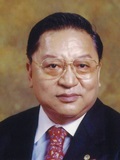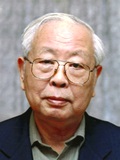
Japan Study Encouragement Award
Tosh Minohara(Professor, Graduate School of Law and Politics, Kobe University)
“Amerika no Hainichi Undo to Nichibei Kankei ‐ ‘Hainichi Imin Hou’ wa Naze Seiritsu Shitaka”- English translation: “The Anti-Japanese Movement in the United States and US-Japan Relations: Why the “Japanese-Exclusion Act” was Enacted”(Asahi Shimbun Publications, 2016)
Recipient’s remark

It is a tremendous honor to receive the prestigious “Japan Study Encouragement Award” for my monograph entitled The Anti-Japanese Movement in the United States and US-Japan Relations: Why the “Japanese Exclusion Act” was Enacted (Asahi Shimbun Press, 2016) from the renowned Japan Institute for National Fundamentals. .This book is unique in that it departs from the traditional realm of diplomatic history and ventures forth to examine in-depth issues distant from national interest and power can at times also adversely impact bilateral relations. There is no doubt that the anti-Japanese movement in California in the prewar period was an indirect factory which led to the outbreak of the Second World War. A United States which had lost its moral leadership of being the leader of freedom and democracy led to the disillusionment of many Japanese internationalists which in turn forced them into silence. In their place, the voices of the right wing and the military became much louder which promoted Japan to make a “return to Asia.” In this way, one can see that is not only hard politics that affect bilateral relations.
Finally, I would once again extend my gratitude to the selection committee that that the academic scholarship of my work was befitting of this fine award.
Recipient’s biography
Tosh Minohara , born in 1971, is a Japanese American from California. He is Professor of International Relations and Security Studies at the Graduate School of Law and Politics, Kobe University where he also holds a joint appointment with the Graduate School of International Cooperation Studies. He received his B.A. in International Relations from University of California, Davis, and his M.A. and Ph.D. in Political Science and Diplomatic History from Kobe University. He also is currently the chairman and executive director for the Research Institute of Indo-Pacific Affairs (RIIPA) which he founded.
In the past, he has had various visiting appointments with such universities as Harvard University, University of California at Irvine, University of Iowa (Noguchi Distinguished Fellow), University of Oxford, Leiden University, Stockholm University, Kuwait University, Seoul National University, Inha University (ROK), National Taipei University, and Academia Sinica in Taiwan.
His main academic interest is in the diplomatic, political, intelligence, and security dimensions of US-Japan relations, from both a historical and contemporary perspective. His research interests also include the individual foreign policies of both Japan and the United States.
He has published multiple monographs and his first, The Japanese Exclusion Act and US-Japan Relations [in Japanese] (Iwanami Shoten, 2002), was awarded the Shimizu Hiroshi Prize in 2002. He is also the editor of Tumultuous Decade: Empire, Society, and Diplomacy in 1930s Japan (University of Toronto Press, 2013), Decade of the Great War: Japan and the Wider World during the 1910s (Brill, 2014), and most The History of US-Japan Relations: From Perry to Present (Palgrave Macmillan, 2017). He is currently co-editing, Beyond Versailles: The 1919 Moment in East Asia (Lexington Press, 2019).
In addition to a monthly serialized essay in the journals Kiwameru, Daisanbunmei, and Issatu no Hon, he also writes an op-ed column for Jiyu Minshu (the official LDP paper) as well as Sankei Shimbun. He is a frequent commentator for various media outlets throughout the world and attends many international Track 1.5 and Track 2 conferences such as the Shangri-La Security Dialogue, Asia Pacific Roundtable, and the Ketagalan Forum among others. In addition to Asahi TV and Asahi Radio in Osaka, and NHK TV and NHK Radio in Tokyo, he appears frequently as a navigator for programs on National Geographic.
Japan Study Encouragement Award
Pema Gyalpo(Professor, Takushoku University)
“Giseisya 120 mannin Sokoku wo Chugoku ni Ubawareta Chibetto Jin ga Kataru Shinryaku ni kiduiteinai Nihonjin ”- English translation: “A Warning to the Japanese from a Tibetan Whose Country Was Invaded by China with 1,200,000 of Its People Victimized: Be on Alert for the Terror of China’s Inherently Aggressive Expansionism”(Heart Syuppan, 2018)
Recipient’s remark

I would like to extend my heart-felt gratitude to Ms. Yoshiko Sakurai, President of the Japan Institute for National Fundamentals, and other distinguished members of Kokkiken, for giving me the Japan Study Encouragement Award, which is more than I deserve.
My homeland, Tibet, where I was born, lost its independence, together with peace, as it fell victim to China’s territorial expansionism. With 1.2 million fellow Tibetans killed directly or indirectly to date, Tibet remains colonized by China and its population continues to live under the threat of ethnic cleansing.
I am always grateful to Japan, a free society, and its people for having warmly accepted and helped me grow up. For many years now, I have felt a sense of crisis about the fact that the Japanese people have been unconscious of the creeping threat from China. I have kept ringing the alarm about the appalling situation to prevent the people in my second home country — Japan — from suffering the same sorrow and humiliation as Tibet. The book that has earned me this award is part of my effort to that end.
It goes without saying that this award is going to be a great encouragement for me personally. On this particular occasion, I would like to acknowledge that my special thanks go to Mr. Kotaro Miura, who served as editor of the book; Mr. Hiroaki Hidaka, President of Heart Shuppan publishing company; and Mr. Yoshihiko Nishiyama of the Editorial Department of Heart Shuppan. I feel equally grateful to those universities that have given me an environment where I have been able to freely pursue my research as well as those Japanese people who have taken care of me. Last but not least, I resolve anew to keep devoting myself to the freedom and peace of Asia.
Recipient’s biography
Born in Nyagrong, Kham, eastern Tibet, in June 1953, Pema Gyalpo and his family escaped to India in 1959 when Chinese troops invaded Tibet. In 1965 when he was 12, he came to Japan alone to study at public junior and senior high schools in Saitama Prefecture with assistance from Japanese supporters of Tibetan refugees. In 1976, he graduated from the Faculty of Law of Asia University in Tokyo. He became the inaugural representative of the Dalai Lama in the Asia-Pacific region in 1980 and the first non-Japanese member of the Nihon Sakka (authors) Club (now Nihon Bungeika Club) in 1991. He started a career of professorship at Gifu Women’s University in 1996 and became a professor of law at Toin University of Yokohama in 2004. He became a naturalized Japanese citizen in 2005. Currently, he is a professor at the Graduate School of International Cooperation Studies of Takushoku University; director emeritus of the Tibet Culture Center in Tokyo; chairman of the Asian Solidary Council for Freedom and Democracy in Tokyo; an advisor to the president of Mongolia; and a special advisor to the prime minister of Bhutan.
Pema has written many books, including Chibetto Nyumon (An introduction to Tibet) (Nicchu-shuppan); Chugoku to tatakatta Chibettojin (The Tibetans who fought against China) (ditto); Kuni wo Suterarenai Nihonjin no Higeki (Tragedy of the Japanese who cannot leave their country) (Kodansha): Tachiagare Nippon! Mezameyo Uruwashi no Kuni (Rise up, Japan! Open your eyes, the beautiful country) (Rai-in Shuppan); Chugoku ga Kakushi Tsuzukeru Chibetto no Shinjitsu; Bukkyo Bunka to Chibetto Minzoku ga Shometsu Suru Hi (The facts about Tibet that are kept suppressed by China; the day the Buddhist culture and the Tibetans disappear) (Fusosha); and Nihonjin ga Shiranakatta Chibetto no Shinjitsu (The facts about Tibet the Japanese are unaware of) (Kairyusha).
Japan Study Special Award
Ikuhiko Hata(Modern Historian)
“Conmfort Women and Sex in the Battle Zone”(Hamilton Books, 2018)
Recipient’s remarks
 The comfort women issue is a collection of accounts that would have otherwise remained less visible on the shady sides of history.
The comfort women issue is a collection of accounts that would have otherwise remained less visible on the shady sides of history.
I once read an archived dispatch the Japanese Embassy in Seoul sent to the Foreign Ministry in Tokyo. It recorded a scene in which an official of the South Korean Foreign Ministry responsible for dealing with Japan grumbled to a secretary of the Japanese Embassy that the issue “is not a theme decent diplomats should discuss in the daytime.” For my part, I had harbored a similar feeling. But what really became my last work, this book, was unexpectedly taken to broad daylight.
Though it turned out to be my “last” work, I have no intention to avoid my responsibility as a historian. Historians are obliged to stem any political motive to distort facts and jeopardize national interests. For many decades, I had keenly felt that Japan must rectify its weakness in the area of overseas dissemination of information. Against this background, I had kept insisting that any project to publish a Japanese research book in English should (1) choose a first-rate U.S. publishing house with a strong distribution network, (2) market the English edition to those who really need and are willing to buy it on their own, instead of presenting copies free of charge and (3) commission the translation to a native English speaker who is closely versed in the particular field covered by the original Japanese book.
I am pleased that the project for the English book, which is chosen for the special award, met all the criteria I mentioned above. My special thanks go to Mrs. Yumiko Mori who represented me in the efforts to find out a U.S. publishing house and negotiate with it. I heard that she was a tough deal maker. My special thanks for go to Dr. Jason Morgan, a historian and researcher specializing in Japan, for his smooth, fluent translation of my book.
I am equally grateful to Mrs. Reiko Nagano, secretary-general of the Japan Forum for Strategic Studies, and Dr. Sukehiro Hirakawa as well as many other people for the successful management of the project and financial support.
By the way, relations between Japan and South Korea are at their worst point since they normalized their diplomatic ties. The two governments reached a formal agreement in 2015 to “finally and irrevocably” resolve the comfort women issue. Nevertheless, the agreement is now in a state of having been effectively made null and void — unilaterally by South Korea.
After the end of World War II, the United States requested Japan to “baby” South Korea as its “former colonial ruler.” Japan has complied with the U.S. request, having kept “babying” South Korea. But it has finally reached the limit of patience. I think that now is the time for Japan to counter South Korea’s unilateral activities vis-à-vis our country.
Recipient’s biography
Ikuhiko Hata is a historian, specializing in modern and contemporary history of Japan and military history. Born in Yamaguchi Prefecture, Japan, in 1932, he earned his Ph.D in political science from the Faculty of Law of the University of Tokyo. After graduating from the university, he joined the Japanese Finance Ministry, which gave him opportunities to study at Harvard University and Columbia University. He taught at the National Institute for Defense Studies and served as the chief of the Finance Ministry’s Office of Fiscal History. He then pursued an academic career, teaching at Princeton University as a visiting professor and at Takushoku University, Chiba University and Nihon University as a professor. He received the Kikuchi Kan Prize in 1993; the Mainichi Publishing Cultural Award in 2014 for Mei to An no Nomonhan Shi (Bright and dark sides of Nomonhan history) (Tokyo: PHP Institute, 2014); and the 30th Seiron Award in 2015.
He has written numerous books, including the enlarged version of Nankin Jiken (Nanking incident) (Tokyo: Chuokoron-shinsha, 1986); Ianfu to Senjo no Sei (Comfort women and sex in the battle zone) (Tokyo: Shinchosha, 1999); Hirohito, The Shōwa Emperor in War and Peace (Kent, UK: Global Oriental, 2007); Ianfu Mondai no Kessan (The bottom line of the comfort women issue) (Tokyo: PHP Institute, 2016).

